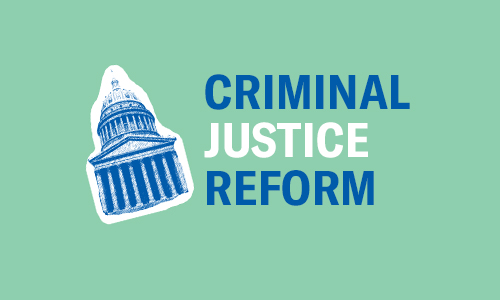In 2019, we are seeing a wave of positive criminal justice reform coming out of the West Virginia Legislature. A number of bills have already been introduced and started moving through the Legislature. We will be working to carry them to the finish line. We are committed to ensuring that civil liberties are extended to everyone, including those caught up in our broken justice system.
We are working to reform the current criminal justice system at each point of contact: at the outset, limiting arrests in the first place; in the middle, by ending mass incarceration and improving conditions; and at the back end by creating a path for reintegration. To keep you up to date on all the things criminal justice going on under the dome, we have compiled a list of bills to keep an eye on:
Preventing Contact
We want to prevent a first contact with the justice system by decreasing police intervention in our lives. This includes efforts to end the war on drugs and reform policing behavior.
Civil Asset Forfeiture
Under current law, police can seize property and assume permanent possession of it without convicting, or even charging, the owner with a crime. A bill to prohibit civil asset forfeiture is expected to be introduced soon. Unless the owner has been convicted of a crime, their property should be returned to them. Agencies and district attorneys at the state, county, and municipal level should also be required to report the number of items forfeited and their dollar value. These reports should indicate whether the forfeiture was accompanied by a criminal charge or conviction.
HB 2331
The war on drugs has been a complete failure. Drug use has not declined, while millions of people–disproportionately poor people and people of color—have been caged and then branded with criminal records. It is long past time to decriminalize cannabis and pass laws that allow for recreational use.
Ending Mass Incarceration
Jail and prison populations in West Virginia have exploded in recent years. We are losing a generation and destroying families. We must end the scourge of mass incarceration.
HB 2190
HB 2190 is looking to change the state’s broken bail system. Under this legislation, individuals charged with nonviolent misdemeanors could be released on personal recognizance. In other words, rather than having to post cash bail, these individuals would simply give their word that they will appear in court when required. This would save the state and counties millions of dollars each year in housing costs to detain such offenders. HB 2190 would also grant freedom to thousands of individuals who are being held in jail without a conviction because they cannot afford bail. This bill is a start, but it is not enough. We are working to amend this bill to make it better.
Creating a Path for Reintegration
Once you’ve served your time, you shouldn’t be expected to re-enter society with both hands tied behind your back. We want to create opportunities and support for the formerly incarcerated to successfully re-enter society and significantly decrease any chance they will offend again.
HB 2459
With this bill, West Virginia is planning to end its absurd prohibition on individuals convicted of drug-related felonies from being eligible for SNAP food assistance benefits. Permanent residents of West Virginia who have been released from prison for a drug felony would become eligible for food assistance benefits upon the passage of HB 2459. It’s important to note that West Virginia is one of only three states that prohibits SNAP benefits for people convicted of drug felonies. This bill would provide much needed assistance to low-income West Virginians that have been convicted of a felony. As it stands, a person with a murder conviction can qualify for SNAP benefits while a person with a felony drug conviction cannot.
SB 236
The vast majority of felons in West Virginia are free to vote once they have completed their sentence. Under SB 236 the state would notify reintegrating citizens of their right to vote and provide them with a voter registration form one week of completing their sentence and regaining their eligibility to vote.
SB 152
SB 152 extends eligibility for expungement to individuals convicted of non-violent felonies. Under current West Virginia law, only those convicted of a misdemeanor offense were eligible to have their crimes erased from record. This bill also requires those convicted of misdemeanors to wait one year after completing their sentence before being eligible to file a petition and those convicted of non-violent felonies to wait three years after completing their sentence before being eligible.
HB 2003
Similar to SB 152, this bill seeks to extend expungement eligibility, specifically to those who committed a crime between the ages of 18 – 26. The current law only allows for misdemeanor crimes to be expunged but HB 2003 wants make individuals convicted of any offense between the ages of 18 – 26 eligible for expungement.
HB 2083
This bill would require the Division of Corrections to work with the Division of Motor Vehicles to ensure that every inmate being released have a valid identification card. The inmates are expected to pay the fees charged by the DMV unless they are unable to do so, giving every individual, regardless of financial status, access to an ID card. Inmates may have their IDs expire or lose them during their time in jail or prison. This bill would ease an individual’s reintegration into society by enabling them to complete employment forms, apply for housing, cash and deposit checks and receive medication.

